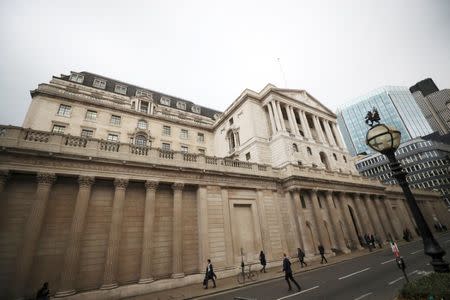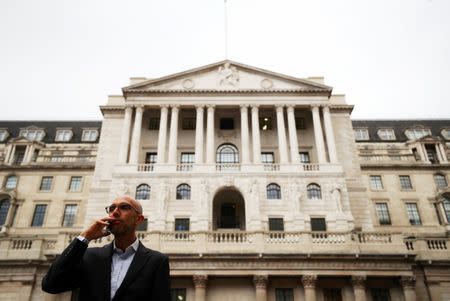New Bank of England deputy says not ready to vote for rate hike
By David Milliken and William Schomberg
LONDON (Reuters) - The Bank of England's new deputy governor distanced himself from the central bank's majority view that interest rates probably need to rise soon, and another newcomer said her support for that position was "very contingent on the data".
Sterling and government bond yields fell as investors took the comments from Deputy Governor Dave Ramsden and policymaker Silvana Tenreyro as a sign that even if the Bank raises rates in November, further increases are unlikely to happen quickly.
Ramsden said he was not part of the majority of BoE policymakers who believe a rate hike is likely to be needed "in the coming months" because he saw little sign of inflation pressure building in Britain's labour market.
"Despite continued robust growth in employment, there is no sign of second-round effects onto wages from higher recent inflation," he told a committee of MPs in his first public comments on monetary policy.
Ramsden joined the Bank last month after serving as the British finance ministry's top economic adviser.
Tenreyro, an external member of the Monetary Policy Committee, said she might back a rate hike "in the coming months" if inflation pressure builds in the labour market, but she was keeping a close eye on how the economy performs.
"My view is that we are approaching a tipping point at which it would be necessary or justified to remove some of that stimulus," she said, also making her first policy comments to parliament's Treasury Committee.
"However that is very contingent on the data."
Tenreyro, a professor at the London School of Economics, said raising rates too soon would be a costly mistake.
CARNEY SEES CONTINUED GROWTH-INFLATION TRADE-OFF
Britain's economy has slowed this year, hurt by the rise in inflation since the 2016 Brexit vote and uncertainty about the country's future trading ties with the European Union.
Even so, the Bank said last month that most of its rate-setters expected to increase borrowing costs in the coming months, partly because Brexit would lead to higher inflation.
Financial markets now see a roughly 80 percent chance that a first hike will come on Nov. 2, after the Bank's next policy meeting.
"The debate is now about what message the BoE will send alongside the first hike. We expect the BoE to strike a cautious tone in November, while indicating that further tightening will still probably be required next year," JP Morgan economist Allan Monks said.
BoE Governor Mark Carney told the committee on Tuesday that the central bank still had to balance the need to support job creation and growth with an inflation rate that is running above target.
Data on Tuesday showed British inflation hit 3 percent in September, its highest level in more than five years and above the Bank's 2 percent target.
But much of the increase has been caused by the fall in the value of the pound since the Brexit vote, which is likely to be a temporary driver of price increases.
Sterling lost half a cent against the U.S. dollar and British government bond yields fell to their lowest since immediately after last month's surprise comment from the Bank that a rate hike could come soon. [GBP/][GB/]
Neil Jones, Mizuho's head of currency sales for hedge funds in London, said Tuesday's BoE comments "signalled a dovish and cautious stance among policymakers".
(Writing by William Schomberg; Editing by Stephen Addison)

 Yahoo News
Yahoo News 

